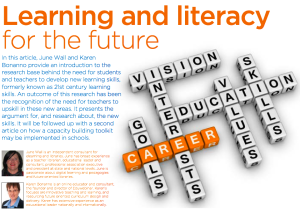Recommended Readings
Denise Brosseau (2014)
Ready to be a thought leader: how to increase your influence, impact and success
The how-to guide to becoming a go-to expert
Within their fields, thought leaders are sources of inspiration and innovation. They have the gift of harnessing their expertise and their networks to make their innovative thoughts real and replicable, sparking sustainable change and even creating movements around their ideas. In Ready to Be a Thought Leader?, renowned executive talent agent Denise Brosseau shows readers how to develop and use that gift as she maps the path from successful executive, professional, or civic leader to respected thought leader.
Tony Wagner (2014)
The Global Achievement Gap: Why Even Our Best Schools Don’t Teach the New Survival Skills Our Children Need – and What We Can Do About It
In The Global Achievement Gap, education expert Tony Wagner situates our school problems in the larger context of the demands of the global knowledge economy. He illustrates that even in our best schools, we don’t teach or test the skills that matter most for the twenty-first century. Uncovering what motivates today’s generation to excel in school and the workplace, Wagner explores new models of schools that are inspiring students to solve tough problems and communicate at high levels. An education manifesto for the 21st century, The Global Achievement Gap is a must-read for anyone interested in seeing our young people achieve their full potential, while contributing to a strong economy and vibrant democracy.

June Wall and Karen Bonanno (2014)
Learning and literacy for the future
SCAN, Volume 33, Issue 3, pp. 20-28In this article, June Wall and Karen Bonanno provide an introduction to the research base behind the need for students and teachers to develop new learning skills, formerly known as 21st century learning skills. An outcome of this research has been the recognition of the need for teachers to upskill in these new areas. It presents the argument for, and research about, the new skills. It will be followed up with a second article on how a capacity building toolkit may be implemented in schools.Scan is a leading refereed journal that focuses on the interaction between information in a digital age and effective student learning. Scan offers engaging professional support for all educators.
Mal Lee and Martin Levins (2012)
Bring Your Own Technology
This book is designed to provide teachers and parents alike an insight into the bring-your-own-technology (BYOT) revolution sweeping across entire school communities in Australia, the US and UK, and explain the immense implications of these developments.
Jonathan Bergmann and Aaron Sams (2012)
Flip your classroom: reach every student in every class every day
It started with a simple observation: Students need their teachers present to answer questions or to provide help if they get stuck on an assignment; they don’t need their teachers present to listen to a lecture or review content. From there, Jonathan Bergmann and Aaron Sams began the flipped classroom: Students watched recorded lectures for homework and completed their assignments, labs, and tests in class with their teacher available. Bergmann and Sams found that their students demonstrated a deeper understanding of the material than ever before. Learn what a flipped classroom is and why it works, and get the information you need to flip your own classroom. –from publisher description.
Education for Life and Work: Developing Transferable Knowledge and Skills in the 21st Century describes the important set of key skills that increase deeper learning, college and career readiness, student-centered learning, and higher order thinking. These labels include both cognitive and non-cognitive skills- such as critical thinking, problem solving, collaboration, effective communication, motivation, persistence, and learning to learn. 21st century skills also include creativity, innovation, and ethics that are important to later success and may be developed in formal or informal learning environments.
Carol C Kuhlthau, Leslie K Maniotes & Ann K Caspari (2012)
Guided Inquiry Design: A Framework for Inquiry in Your School
The Guided Inquiry Design Process, which has eight phases, is an ideal framework for schools to use to develop a learning matrix to support to development and delivery of information literacy across all year levels within an inquiry based curriculum.
Donald Trump & Robert Kiyosaki (2011)
The Midas Touch: why some entrepreneurs get rich and why most don’t.
Explore the five-finger plan to success
and see how you can apply this
business model to your job.
Seth Godin (2010)
Linchpin: are you indispensable?
The 7 abilities of a linchpin, as presented by Godin, have a unique connection to the work of exceptional educators.
(1)Providing a unique interface between members of the organization; (2) Delivering unique creativity; (3) Managing a situation of great complexity; (4) Leading customers; (5) Inspiring staff; (6) Providing deep domain knowledge; and (7) Possessing a unique talent.
Dr Ken Robinson (2009)
The element: How finding your passion changes everything
Robinson states there is a preoccupation with certain sorts of academic ability…hierarchy of subjects…and the growing reliance on particular types of assessment. His argument is this is stifling the powers of creative thinking.Being in the element, according to Robinson, means there is a mix of aptitude, passion, attitude and opportunity.There are enlightening stories captured in his book about successful people who were marginalised at school yet found their element – Mick Fleetwood from Fleetwood Mac, Matt Groening the creator of The Simpsons, Sir Ridley Scott an award-winning director, Meg Ryan the actor, and the mobile telephone salesman and Britain’s Got Talent sensation, Paul Potts.
Carol C. Kuhlthau (2007)
Guided Inquiry: Learning in the 21st century
For those wanting to explore inquiry based learning and the essential scaffolding that needs to be evident to support students through the research process, Kuhlthau’s book is a must read. The six stage “information search process” is strongly supported by research, theory and practice. The expertise, roles and responsibilities of instructional teams is explored in the context of K-12 education.
